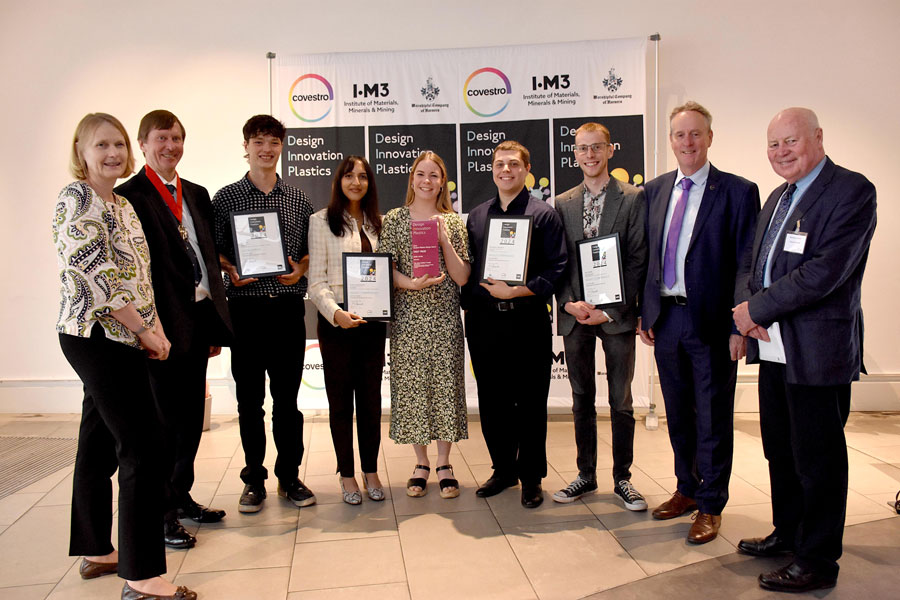DIP Awards: Glasgow students sweep the board at product design awards
First place winner Isabel Payne created a self-powered cleaning device for feminine products

IOM3 is one of the supporters of DIP - one of the longest running plastics design competition of its kind for university undergraduates in Europe.
This year’s contestants were asked to design an off-grid product for independent living, aimed at either leisure or household markets, and to be made primarily of plastics.
The panel of industry judges admitted to being blown away by the quality of the designs produced by this year’s finalists in what had been a very challenging brief.
First prize went to Isabel Payne, a Product Design Engineering student, from Glasgow School of Art, who created SafiCase – a device for cleaning and steam sterilising re-usable menstrual cups, using minimal water. The case is entirely self-powered, using a solar battery for the sterilising circuit, and is targeted at women who want something to use when they are nowhere near an electricity source, or any running water. It is collapsible so can be carried easily.
Isabel used medical grade silicone for the collapsible casing; polypropylene for the circuit housing, water spout and lid, and HDPE for the solar battery base.
She wins £1,000, a placement with a DIP sponsor, a year’s membership to IOM3, and an invitation to the annual banquet of the Worshipful Company of Horners.
Chairman of judges, Richard Brown, said: 'This is a great solution to safely clean a menstrual cup without power, and to maintain hygiene. This product uniquely addresses the off-grid challenge, and meets a very clear social need, not just for the traveller but also, for example, displaced people living in refugee camps. It was very well researched and is a very worthy winner with a product idea which could be commercialised.'
Isabel said: 'It means such a lot to have a platform for dealing with the issue of period poverty, which is rarely spoken about, despite affecting so many people worldwide and around 40% of women in the UK. I hope this design helps bring awareness for reusable options, and helps other people decide to invest time in designing more solutions, as there is very little innovation in this area.'
The judges awarded second place to Jake Lee (Product Design Engineering) also of Glasgow School of Art, for his product ‘SkinTemp’, a cold-water temperature sensor that alerts users to dangerous drops in body temperature. Jake used Poly(methyl methacrylate) PMMA, for the central module of his product; fluorinated ethylene propylene (FEP) for the flexible thermo-electric generator pads housing, and liquid silicone rubber (LSR), for the watertight seal. He wins £750 and a placement with a DIP sponsor.
In third place was Glasgow School of Art’s Jem Mitchell, also a Product Design Engineering student, who produced ‘Sentree’, a solar powered sonic deterrent that protects trees from being overgrazed by animals such as deer. He used polypropylene for the casing and many internal parts; TPU for the elastic belt, and foil for the sensing interfaces. Jem wins £500 and a placement with a DIP sponsor.
Highly commended awards go to:
- Gargi Agrawalla (Product Design and Technology), Loughborough University, with ‘Ear Boost+’, a compact healthcare case that dehumidifies cochlear implants and charges their batteries simultaneously, while being powered independently.
- Brandon Hopkins (Product Design), London South Bank University, with ‘Saltbuoy’, a free-drifting oceanographic data buoy powered by salt-water batteries. It collects real-time data for pollution, weather and climate research.
- Joe Shade (Product Design), De Montfort University, with ‘Bijou Smart Hive’ – a smart beehive using solar power and sensors to monitor the conditions of the hive and the bees to keep them healthy and productive.
All three highly commended recipients receive a cash prize of £250.
Richard Brown added: 'All the finalists showed they have the skills to bring new, innovative and functional products to market. Creativity and invention is alive in our future designers, demonstrated in the many entries we received overall.'







